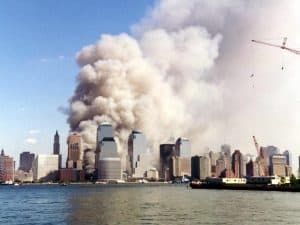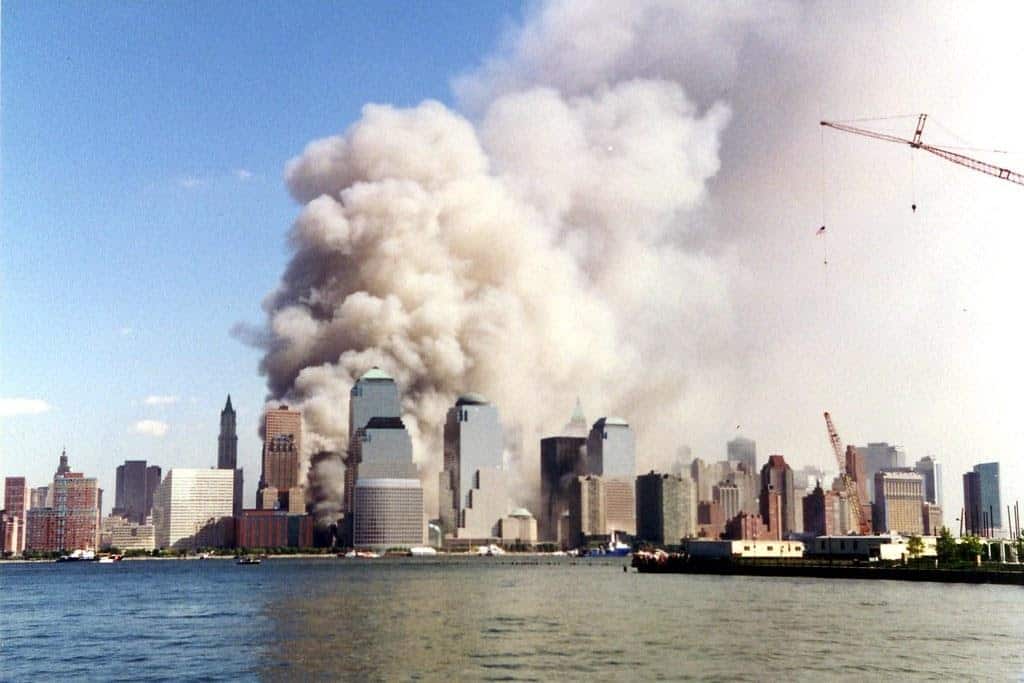September 11, 2001 marked one of the worst ever terror attacks on American soil. Two hijacked planes crashed into and destroyed the World Trade Center’s Twin Towers, one crashed into the Pentagon, and one crashed in rural Pennsylvania. Nearly 3,000 people were killed, 8,900 were injured, and thousands more were left traumatized after experiencing the attack.
The 9/11 terrorist attacks have also significantly affected U.S. foreign and domestic policy by increasing security and surveillance measures and fueling ongoing wars in Iraq and Afghanistan. The attacks also led President George W. Bush to create the Department of Homeland Security in 2002, which remains active today working to protect United States civilians and combat domestic terrorism.
Career Foreign Service Officer Mary Ryan served as the Assistant Secretary of State for Consular Affairs during the attacks on September 11, 2001. In Congressional testimony, she told how the terrorists who committed the attacks had received legitimate U.S. visas, and described how difficulties and limitations in background checking and interviewing made the visa adjudication process inaccurate. Ultimately, Ryan believed that it was important for other parts of the U.S. government to share its intelligence with consular offices to ensure that they issued visas responsibly and prevented future terrorists from entering the country. Without such coordination, consular officers would not have real-time information that could empower them to prevent potential terrorists from acquiring visas. Despite the lack of information, inter-agency cooperation, and similar circumstances for the Immigration and Naturalization Service (INS) borger agents who actually admitted the terrorists into the United States, Mary Ryan and other front-line consular officers received a lot of criticism and even blame for what happened.
Ambassador Mary A. Ryan’s interview was conducted by Charles Stuart Kennedy on March 26, 2003.
Read Mary A. Ryan’s full oral history HERE.
Click HERE and HERE to read more about the terrorist attacks on 9/11/2001.
Drafted by Genevieve Husak
ADST relies on the generous support of our members and readers like you. Please support our efforts to continue capturing, preserving, and sharing the experiences of America’s diplomats.
Excerpts:
“It’s always easy to go after the State Department. They’ll never go after the intelligence or law enforcement – particularly not the FBI… everybody else has protection and we have no constituency.”
Lack of Information: What I knew, what I fortunately knew almost immediately, when there was so much information in the newspapers and the media about these men, was that some part of our government had information on them that was not given to us. And that was, to me, easily apparent. Because how else would you know who would have done this? How would you know who did it? And I actually thought that perhaps it was an FBI agent on planes following them. But then I thought, “Well, no, they probably would be at the destination points to pick them up to follow them.” And what I believe, still, to my dying day, is that we were not told about the ones they knew about, because they wanted them in the country, because they wanted to follow them, they wanted to build a case, they wanted to prosecute them here. I will always believe that. I mean, I have no proof of that, and the FBI will deny that, and I’m sure the CIA will deny it, but that’s what I believe based on my experience of building cases of visa fixes, in which I have experience with them wanting them to come here so they could be arrested here and be prosecuted here so we could be sure we could punish them here – not let them walk away from it in some foreign country. I will always believe that, because the FBI, as usual, overestimated its ability to protect the country.
Misplaced Blame: Q: Well, did you feel at the time that you were the “fall guy”?
RYAN: Yes, I did feel that I was the “fall guy”. And fair enough. It’s like what poor Rumsfeld is going through right now. Maybe I should have resigned right away after September 11th. I just didn’t feel that it was our fault – my fault, or the fault of anybody in the Bureau of Consular Affairs, or by extension, any consular officer. I really felt the fault was with intelligence and law enforcement communities, agencies, that should have given us information.
Criticism of Consular Officers: But as I said, it was very bipartisan. Both Democrats and Republicans beat me up terribly at that hearing: that we should have known that all Saudis were security risks to the United States, threats to the United States; how could we have been so stupid as to issue to these people? How come we didn’t know that they were bad? Mr. Lehman, who thinks he knows a great deal more about consular work and consular offices than he really does know, went into a big discussion about how consular offices are looked down on and they’re not as good as other people in the department. And I told him that I think consular officers are the best people in the U.S. government. I said that to Mr. Fielding when he said, “Maybe we should move visas to homeland security.” Well, that’s absurd. I didn’t say that to him. But I said, “Consular officers, State Department officers, consular officers are the best in the Department. Why would you do that?”
Senator Kerrey… I never understood the question that Senator Kerrey was trying to ask me. And my lawyer said afterwards that that was because I had a logical mind, which I was actually thrilled about, because nobody had ever said that to me before. But what I understood from… he kept saying, “Did the President tell you?” Well, the President doesn’t talk to an assistant secretary. I mean, the President? The President? I’m lucky if the secretary talks to me. And I said to him, “What do you mean Senator – commissioner, whatever we called him – that we shouldn’t have issued to any Muslims?” And then he got angry, because that, of course, is what he did mean, but he didn’t want that out. But there’s this very anti-Muslim, anti-Arab attitude in this country and in this government – in parts of this government now – which I really think is un-American and which I really deplore.
TABLE OF CONTENTS HIGHLIGHTS
Education
BA in Political Science, St. John’s University 1958–1963
MA in Political Science, St. John’s University 1964–1966
Joined the Foreign Service 1966
Naples, Italy—Consular Officer 1966–1969
Swaziland—Ambassador 1988–1990
Kuwait—Executive Director of Consular Affairs, Kuwait Task Force 1990–1991
Washington, D.C.—Assistant Secretary for Consular Affairs 1993-2002


